What does future-proof digital marketing training look like?
When it comes to technology, “The ability of something to continue to be of value into the distant future and not become obsolete” seems pretty obvious. We can all recognize items that have become obsolete as technology changes and improves. But, what does future-proof mean in the context of digital marketing training for work and employment?
From my perspective and looking at reviews from experts in education and psychology, to be future-proof is to “Continue to be useful or successful in future when the situation changes.”
This definition sounds a bit woolly but can be distilled into three primary components:
- Being able to identify opportunities by anticipating the future
- Using this knowledge to minimize the effects of shocks and stresses of future events by having a clear strategy
- Then, using this strategy to take action by continuously learning for lifelong employability
With increasing life expectancy and dwindling state resources, it will be important for people to work and remain engaged for longer across their lifespan. Learning agility will be a key behavior and is the focus of Heather McGowan’s provocative titled article, Learning is the New Pension.
She suggests that remaining employed or employable depends not on one’s formative education but on one’s willingness to learn new skills or re-train to address new, novel, and often complex work and life situations.
This is further expanded in her book, The Adaptation Advantage, co-authored by Chris Shipley, where she looks at rates of change and the methods required to successfully take advantage of them.
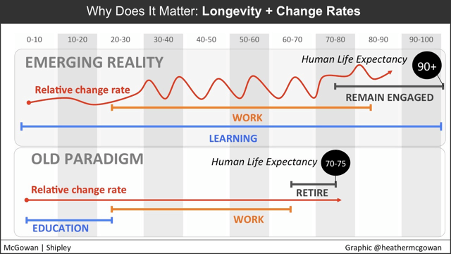
With the expectation that the organization will provide continuous learning opportunities, the demand on leaders to take on a new role as learning facilitator will require planning and support as it may be unfamiliar to many leaders and managers.
“Continuous learning in the workplace must become the new norm if individuals and organizations want to stay ahead.”
- Redefining the role of the leader in the reskilling era, McKinsey Quarterly, December, 2019
Digital marketing training for the workforce: Anticipating the future
If we consider all of the possible futures, how will we know what is on the horizon without a crystal ball? How can we undertake digital marketing training to prepare for each possibility? One of the best ways to find out what is happening is to look at the World Economic Forum’s (WEF) Future of Jobs Report.
For this blog, I will be referring to the 2020 version which showed a number of significant changes compared to the 2018 report. There are a number of findings but the key areas that stood out to me are:
- The ongoing technological augmentation of work and the emergence and disruption of jobs and skills related to this shift in technology
- The projected expansion of mass reskilling and upskilling across all Industries
- The need for new strategies to support effective workforce transitions and how those are required at scale in a short period of time.
The WEF Strategic Intelligence website displays the interconnectedness of elements surrounding workforce and employment issues and a number of those are particularly relevant for people in the marketing industry.
The Fourth Industrial Revolution
If we think about the way that the world of work has shifted, you will recognize that we are now entering an era where the cyber world and the physical world are much more closely aligned, and the systems within which we operate blur these lines even further.
In this paradigm, the concepts of learning agility, adaptability, and sensemaking will become the benchmark for assessing talent in a rapidly changing workforce.
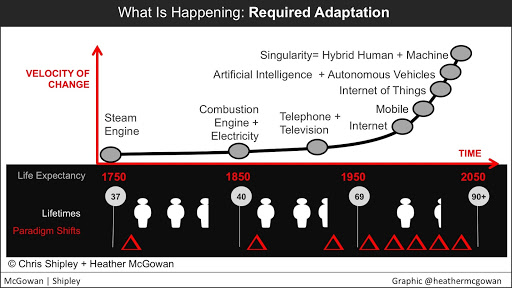
Fourth Industrial Revolution and COVID-19
At the time of writing the world is still gripped by the pandemic related to the coronavirus. As a result of these twin forces, the 4th Industrial Revolution and the recession-related to COVID-19, a number of activities have shifted or accelerated in relation to the world of work.
Most notably, the day-to-day digitalization of our work and life and the large-scale shift to remote working and increase in e-commerce. This has provided a new marketplace for remote employment and remote working activities. For some this has been positive and given them more time and more opportunities to be able to achieve their goals without being hampered by commuting or spending long hours in distant offices. For others though, it has placed an extra burden with homeschooling and potentially having multiple people working in a space that is not built for work.
This inability to separate work and home life may result in a less than optimal balance and one of the areas that this may become apparent is the potential career development crisis relating to professional progress.
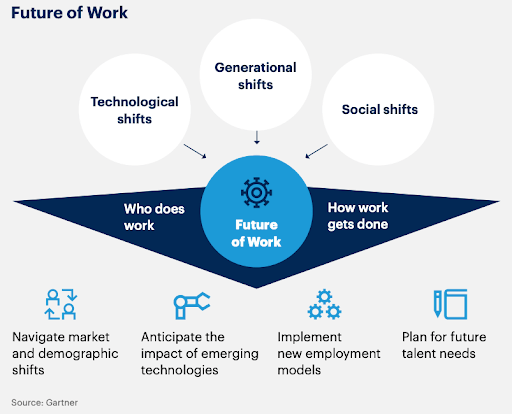
One way to conceptualize these changes was put forward by Gartner and is shown in this graphic which featured in their report on hybrid workforce developments.
What could this mean for the digital marketing workforce?
If we consider Buffer’s T shaped marketer framework as a basic overview for the way that the majority of marketers have their career structured, it's easy to see how this transition to new ways of working and adapting to emerging situations can be relatively easy if we pay attention to the finer details and consider what the future may hold for digital marketing training.
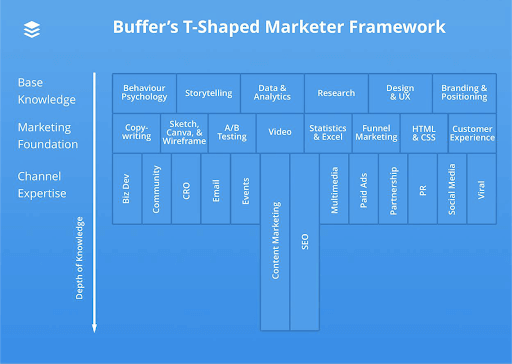
Referring back to the Future of Jobs Report, we'll see that digital marketing and strategy specialist roles are increasing in demand across industries. Additionally, if we look at the specialized skills attributed to product and digital marketing, we can see that there are significant cross-cutting skills that will provide opportunities but also competition in a crowded employment space.
What this means is that we need to have a new way of training and upskilling ourselves that enables it to flow more easily and for us to apply our digital marketing skills in an adaptable way.
In this diagram from Heather McGowan, we will see that the shift is very much from a single discipline and multidisciplinary or T-shaped view as we saw above to a transdisciplinary approach where we see human knowledge and machine learning converge.
Put simply, this is a shift from knowing and having a block of knowledge to “knowing how to know'' and creating a flow of knowledge. This is the key to developing learning agility for shifting in changing situations. As such, digital marketing training for the future must promote flows of knowledge across disciplines.
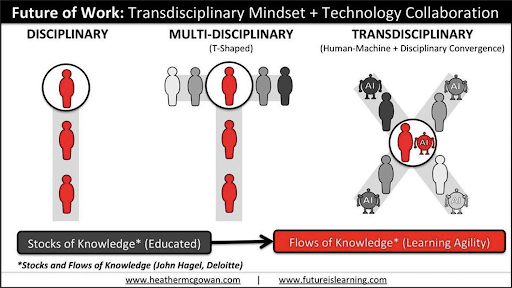
Reflecting on changes in the digital marketing industry it is clear that the days of the strict T-shaped marketer have passed with successful employees in this industry requiring a more distributed level of knowledge and skill. Success in many jobs within digital marketing will depend more critically on an employee’s ability to master emerging technologies quickly rather than expertise in one specific niche technology.
Marketing digitalization and upskilling
When looking to minimize the effect of change on your career, it's important that to keep in mind the direction that businesses and organizations are taking in order to grow and remain competitive. If we refer to the chart below you'll see that overall, businesses are looking to adapt by accelerating a number of processes that they may have already had in place but not acted on yet.
In particular, the digitalization of work processes, providing more opportunities for remote working, and the acceleration of upskilling and reskilling programs.
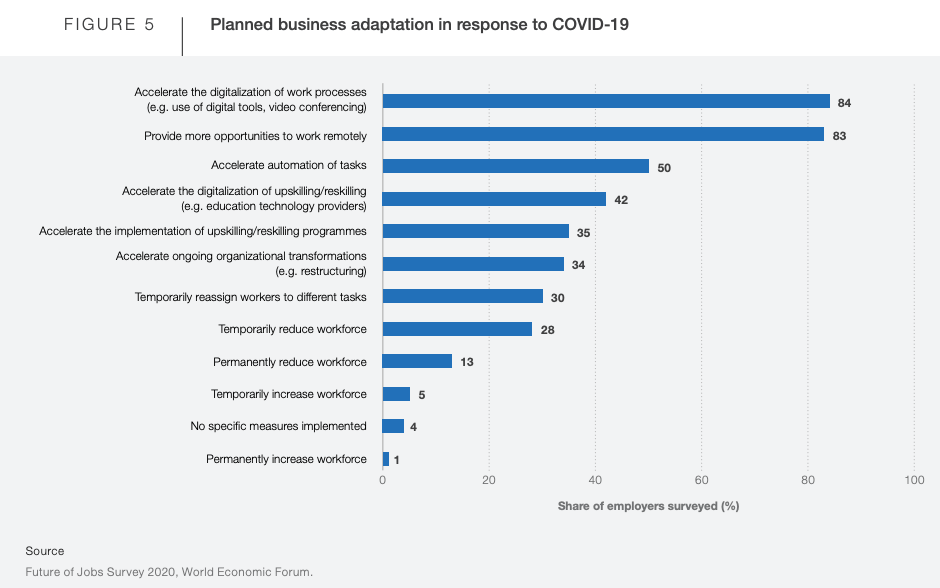
Why is it important to consider what organizations are doing at this time? If we focus specifically on skill-building, we can see that the majority of employers responding to this McKinsey survey, believe that building skills by reskilling existing employees is the best way to lose their capability gaps. In fact, 87% of companies say they have skill gaps or expect to within a few years.
We can also see that digital marketing training is a preferable economic and social choice when compared to hiring or contracting external talent or redeploying employees.
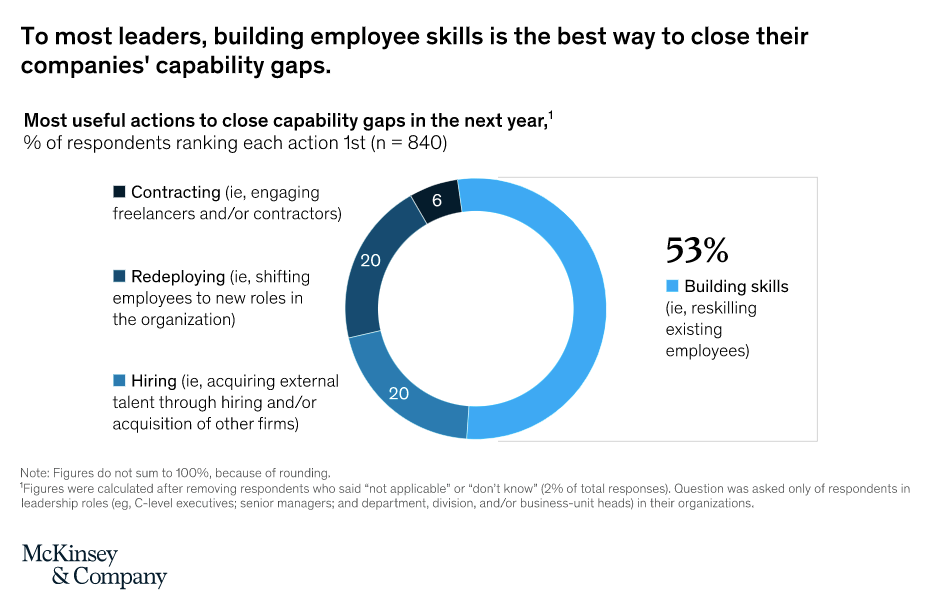
Lifelong digital marketing training
So, if we know what the industry requires, and some people are engaging in self-directed learning, why isn’t everyone engaging in lifelong digital marketing training?
Andrew Bollington, Global Head of Research and Learning for LEGO Foundation in a 2015 OECD Business brief questioned why, with so many opportunities for lifelong learning available at the click of a button, many employers still report a “skills gap” when looking for talented members of the workforce.
Andrew believes the reason for this is that taking advantage of lifelong learning opportunities demands certain skills.
It is critical that we consider each of the questions as individuals but also consider how these might apply to your team members if you are a manager.
When thinking about reskilling or upskilling consider the following:
- Am I motivated to learn, without the constant supervision and support of a teacher?
- Will I be able to relate the knowledge gained to real-life challenges?
- Can I stick at the challenge even when the work gets hard?
- How prepared am I to try something; fail; adapt; then try again until it works.
- Can I critically analyse and evaluate the content rather than simply memorising it?
- Do I have the capacity to play creatively with ideas and solutions?
It is of paramount importance that we are honest with ourselves and we create an environment where employees feel that they are supported and are able to be open and honest when we are considering what it is that we want to achieve.
From the list above, all of the items that are highlighted are considered to be adaptive learning behaviors. This diagram shows the shift that is required in both individuals and organizations. By focusing on individual and systemic development, the change that is required will support the growth of both.
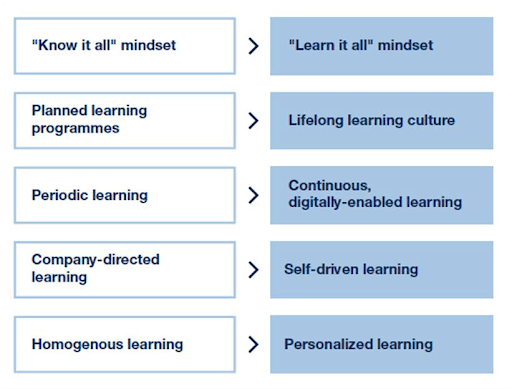
From an organizational perspective, the way to support employees’ growth and development is to provide and actively embody a lifelong learning culture that has an emphasis on learning deeply in the flow of work.
By focusing on improving learning agility and adaptive strategies, it is easier to focus on the application and integration of learning rather than focusing on developing large bodies of knowledge that are rarely applied.
The Consortium for Advancing Adult Learning & Development found that the development of a learning culture is essential for the continuing success of an organization in an ever-changing environment. They identify that learning as an adult may be more difficult as the pain of making mistakes doesn’t roll off as quickly as it might have when we were younger.
Therefore, it is critical that leaders foster an environment of psychological safety where employees are supported and actively encouraged to participate in digital marketing training.
Taking this concept further WEF and the Boston Consulting Group found three core organizational activities that can minimize the impact of change both for employees and business operations.
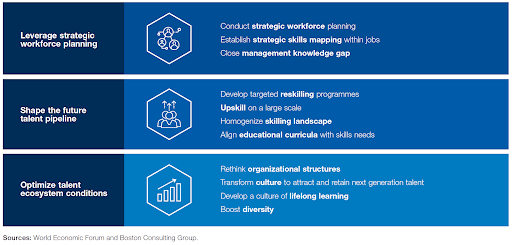
Digital marketing training for lifelong employability
Those of you already familiar with Smart Insights will have seen the RACE Framework which is used for developing your digital marketing plans and strategies. What you may not be familiar with is the Opportunity-Strategy-Action (OSA) cycle that we encourage members to use in order to look for points of difference within a marketing plan that can be used to provide you with the edge. Just like a marketing plan or strategy, it's important that you have a strategy for your own development journey.
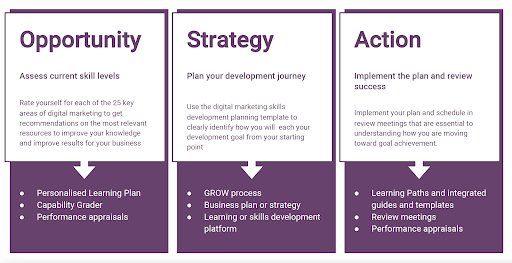
Opportunity
What we would encourage you to do is first look for the opportunity. You can do this by assessing your current skill levels by reading yourself on each of the 25 key areas of digital marketing using our personalized learning plan tool for the capability grader. Another way of doing this is looking at previous performance appraisals and considering the feedback that you've been provided and how that might lead to future opportunities if you were to develop skills in those areas.
Once you have a good idea of the areas that you wish to develop, it will be important for you to look at the essential and business toolkits to further narrow your search. We would suggest that you start your digital marketing training with a narrow focus, later broadening your knowledge across a range of subjects once you are able to see the connection. This is partly to reduce the initial cognitive load but also to allow you to confirm that this is a direction that fits with your goals.
Strategy
The next step is to define your strategy. To do this we would suggest you use the digital marketing skills development template, which is a free download, to define the starting points for your development journey. The template is based on the GROW model which stands for Goals, Reality, Options, and Way forward.
The template is designed for use by individuals or team managers and is developed in such a way that promotes active reflection on your capacity to fulfill your development journey and to set specific goals for your ongoing digital marketing training.
The final pages of the template give you a worked example that you can use for guidance and a blank canvas for you to develop your own plan ready for implementation.
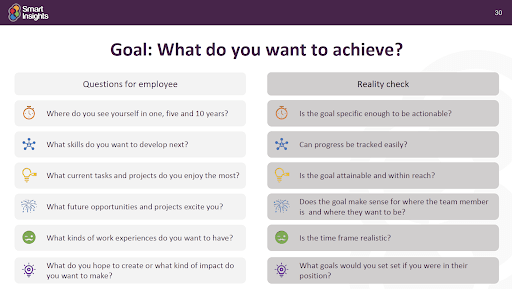
Download our free marketing skills development guide and template
Create a personal skills development plan will help you map out what you want to achieve and how you’re going to achieve it.
Access the
Action
Now you have a plan, it is time for implementation. We would recommend that you begin your training with the Learning Paths with their integrated guides and templates. These Learning Paths have been developed in such a way that they are time efficient and the concepts presented are able to be applied directly to projects you may be working on in the workplace.
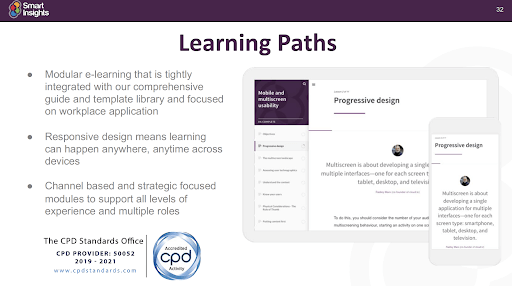
One aspect that often gets overlooked is the review process. In order to get the most out of your plan, it is important to schedule regular review meetings so you can understand how you are moving toward the achievement of your goals. The guidance on these review meetings is contained within the modules on employee development contained within the Learning Paths.
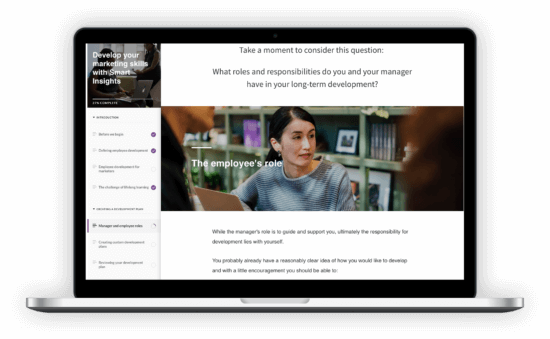
By using the personal dashboard you can also track your own digital marketing training progress. If you are a manager and have access to the team dashboard, similarly you can monitor the employee progress and use this as guidance for conducting performance appraisals in an ongoing way.
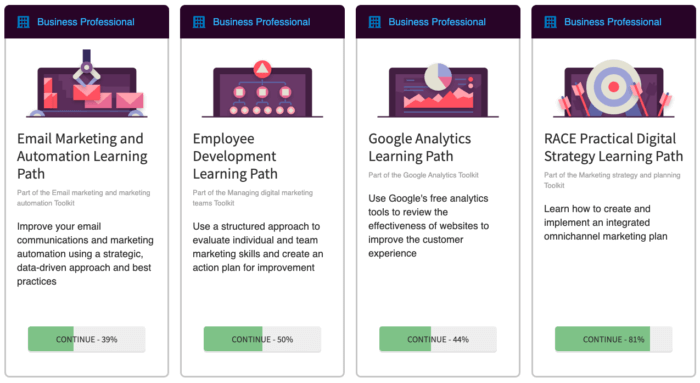
Training to become future-proof
Now we come to the point where we bring it all together. Becoming future-proof is more than just skills and more than a just attitude; it's the combination of these that will make you adaptable and resilient into the future.
What this means for your day-to-day activities can be summarised in the following points.
Advocate for yourself and remain visible
Without in-person meetings, your achievements may not be as visible so make sure the people that matter are aware of your current projects or accomplishments and the role you played making them a success. While you are advocating for yourself remember to make time to share your team’s activities and how they have exceeded expectations. A good way of maintaining visibility is to seek feedback in a structured setting and use this feedback to reflect on what you have achieved and ways forward.
Keep your network alive
Use social channels and video technology to continue building strong professional relationships. A great way to further strengthen your internal network is to set aside time to keep up to date on the activities of other teams. Using this time effectively will increase your engagement and connection amongst colleagues in ways shows that you are a strong and supportive collaborator.
Step up and seize opportunities
Look for opportunities to grow professionally while adding value to the company. By taking proactive steps to show that you're committed to exploring new opportunities you will be able to add value in new and novel ways. Find areas where you can make a more significant impact or contribution to the overall operation of the organization.
Invest in learning
Enroll in an online course or find a podcast to help you grow and learn. Learning can be fulfilling in its own right but by developing a plan for how your newly acquired skills will benefit the business and improve performance is a great way of showing your value across domains. Take the opportunity to share your learnings with your boss and co-workers and actively use their feedback to consider new areas of study or development.
Summary
We are in a period of accelerated change and near-constant disruption for which we need to prepare. Ultimately, success will be achieved by those who are responsive to changing circumstances and adaptive in their learning.






























